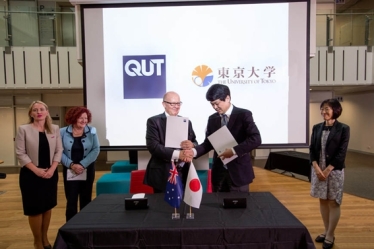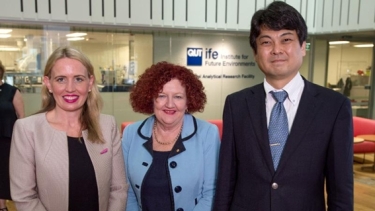RCAST Signs International Cooperation Agreement with Queensland University of Technology

Date of activity: February 15, 2018
The Research Center for Advanced Science and Technology (RCAST), the University of Tokyo signed an International Cooperation Agreement to develop joint venture projects and facilitate joint academic and scientific activities with Australia's Queensland University of Technology (QUT).
This research partnership focuses on developing renewable energy and, in particular, the provision of next generation fuels to meet future global energy needs.
The signing ceremony was held at the Institute for Future Environments (IFE) of QUT and was attended by Professor Masakazu Sugiyama (RCAST), who led the delegation of RCAST, and the QUT Vice-Chancellor Professor Margaret Sheil AO. Also attending were Queensland’s Innovation Minister Kate Jones, Acting Queensland Chief Scientist Dr. Christine Williams, Consul-General of Japan in Brisbane Keiko Yanai, and representatives from Trade and Investment Queensland and Sumitomo Electric Industries.
Professor Sheil said QUT was excited to work collaboratively with RCAST to further research that has real-world global impact.
“The University of Tokyo is a leader in science and engineering research, and RCAST is positioned to deliver this knowledge through collaborations with industry and other universities and research providers around the globe,” she said.
“We are delighted to become a collaborator through the establishment of this International Cooperation Agreement.”
“QUT’s Institute for Future Environments (IFE) has a purpose and outlook similar to RCAST with common alignments in many similar fields of endeavour, and particularly in renewable energy and fuels of the future, such as hydrogen.”
Professor Sugiyama also declared that RCAST would cooperate with IFE/QUT and the Queensland government for the social implementation of future collaborative research results.
Professor Sugiyama is a recognized leader in the sustainable conversion of solar energy to next-generation fuels through the use of leading-edge photovoltaics and compound semiconductors. He has recently demonstrated the highest level of in-field solar conversion efficiency using electrolysis to produce hydrogen from water. He said that “Integration of these technologies into Queensland, which has a strong capacity to implement solar-driven technologies, could lead to higher levels of efficiency and the establishment of new export industries for the state.”

From left, Queensland Innovation Minister Kate Jones, QUT Vice-Chancellor Margaret Sheil AO, QUT Deputy Vice-Chancellor (International and Development) Professor Scott Sheppard, Professor Masakazu Sugiyama, and Keiko Yanai 
From left, Queensland Innovation Minister Kate Jones, QUT Vice-Chancellor Margaret Sheil AO, Professor Masakazu Sugiyama






